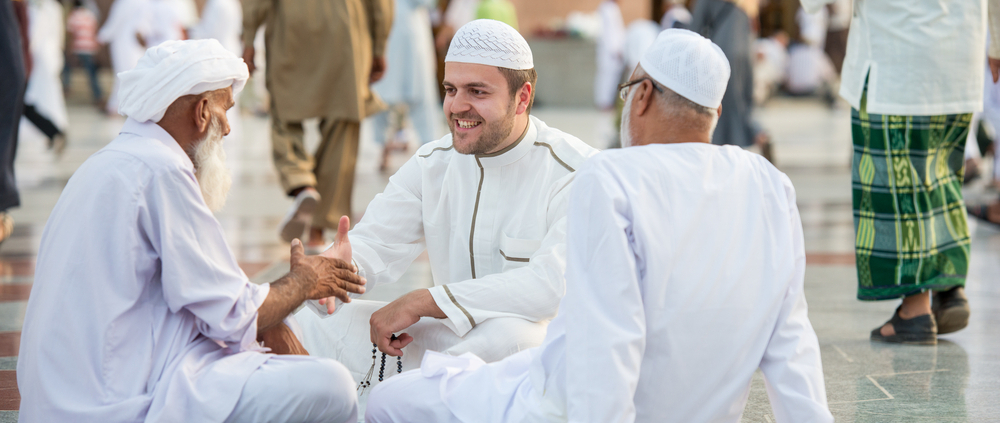What Are the Ethical Standards for Interacting with Opposite Genders?
Answered by Shaykh Yusuf Weltch
Question
I believe it’s okay to be friends with non-muslims and not wear hijab in front of non-Muslim women. My question is that what if they are bisexual or lesbian? If they are trustworthy and respect Islam, is it okay not to observe the hijab in front of them? Is it also okay to have a casual conversation with them where sexuality is not mentioned?
Answer
In the Name of Allah, the Most Merciful and Compassionate
It is not categorically prohibited to have a non-muslim friend. See this link for more details.
Is it Haram to Befriend Non-Muslims?
Legal Nakedness In Front of Non-Muslim Women
The legal minimum necessary to cover between two practicing Muslim women is the area between the navel and the knee, in addition to the back and the stomach areas.
The above applies to two practicing Muslim women. If a Muslim woman is in the presence of non-practicing Muslim women or corrupt/sinful Muslim women, it is impermissible for her to show any part of her body that a male stranger would not be permitted to see: everything except the face, hands, and feet.
The same applies to non-muslim women, even if she is trustworthy.
The only exception to the above is need or necessity.
Interacting With a Bisexual/Lesbian
The above prohibition of exposing oneself to a non-Muslim woman is even more emphatic concerning a non-Muslim woman who finds sexual attraction to women.
Showing any part of the body except the face, hands, and feet is strictly prohibited in such a case.
As for one’s interactions with a lesbian/bisexual, one must keep a level of formality within their interactions and prevent any situation that may lead to an arousal of desire from one or both parties.
This may include seclusion with such a person.
Deviant Sexual Inclinations
Homosexual acts and acts of other deviant sexual proclivities are major sins in Islam. The person who holds such inclinations either by natural dispensation or social conditioning is not sinful unless they act on them or believe them to be permissible.
These inclinations are seen in the Sacred law as a test from Allah Most High. Like any other sinful desire, one must strive to obey Allah Most High. According to the difficulty involved in such efforts, one’s reward will be heightened. Although this is necessarily challenging, one must remember that we were not created for this world but for the Next and that the Next life is better to give preference to.
Separating the Sin from the Sinner
Despite Islam’s clear injunctions about deviant sexual behaviors, we must afford dignity to every human being, especially our friends. You should interact with her with dignity, respect, and good character and try to open the door for her to see the beauty of Islam.
Her homosexuality should never be presented to her as an obstacle to embracing Islam. Despite being a sin, homosexual behavior does not take one out of faith unless one believe it to be permissible to act on.
The priority here is your obedience to Allah Most High, so you must be principled in your approach and relationship with her, as mentioned above.
Final Advice
You may have conversations with her and cordially act with her; however, keep the following advice in mind:
- Keep some level of formality that would prevent any lust or desire from arising
- Keep touching with what is customary for friends
- Do not be in seclusion with her, such that you are alone in a private space with no third party
- Keep ties with her with the intention that you can be a means for her to come to Allah Most High
Hope this helps
Allah knows best
[Shaykh] Yusuf Weltch
Checked and Approved by Shaykh Faraz Rabbani
Shaykh Yusuf Weltch is a teacher of Arabic, Islamic law, and spirituality. After accepting Islam in 2008, he then completed four years at the Darul Uloom seminary in New York where he studied Arabic and the traditional sciences. He then traveled to Tarim, Yemen, where he stayed for three years studying in Dar Al-Mustafa under some of the greatest scholars of our time, including Habib Umar Bin Hafiz, Habib Kadhim al-Saqqaf, and Shaykh Umar al-Khatib. In Tarim, Shaykh Yusuf completed the memorization of the Qur’an and studied beliefs, legal methodology, hadith methodology, Qur’anic exegesis, Islamic history, and a number of texts on spirituality. He joined the SeekersGuidance faculty in the summer of 2019.
